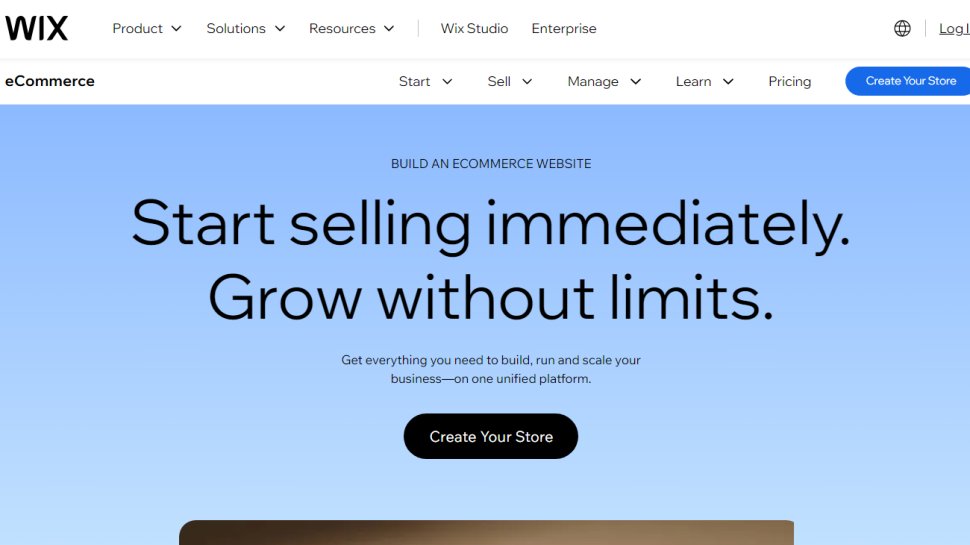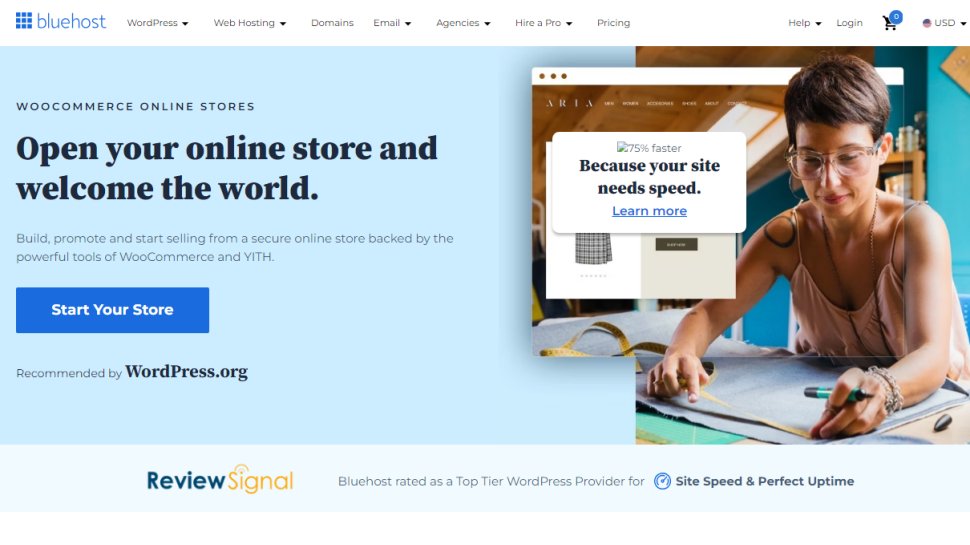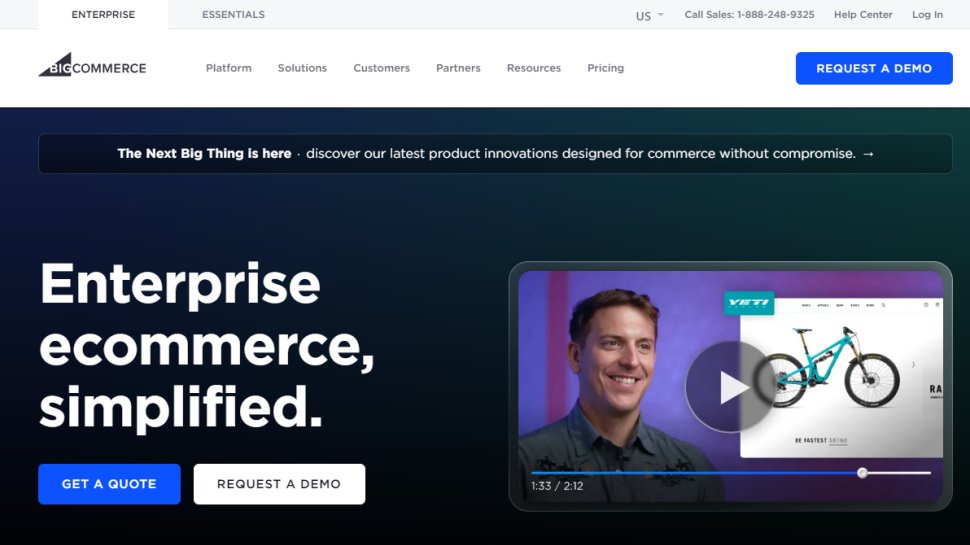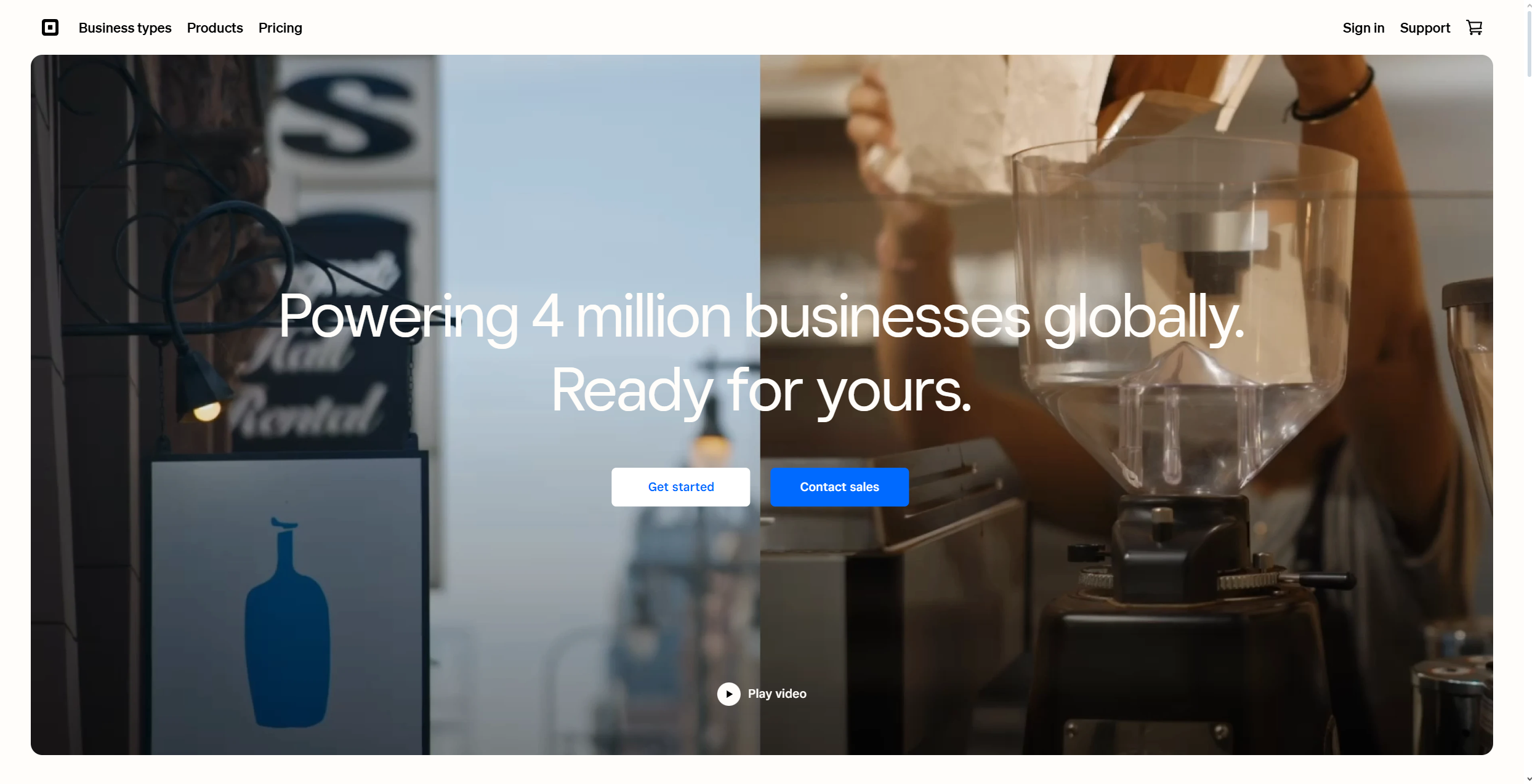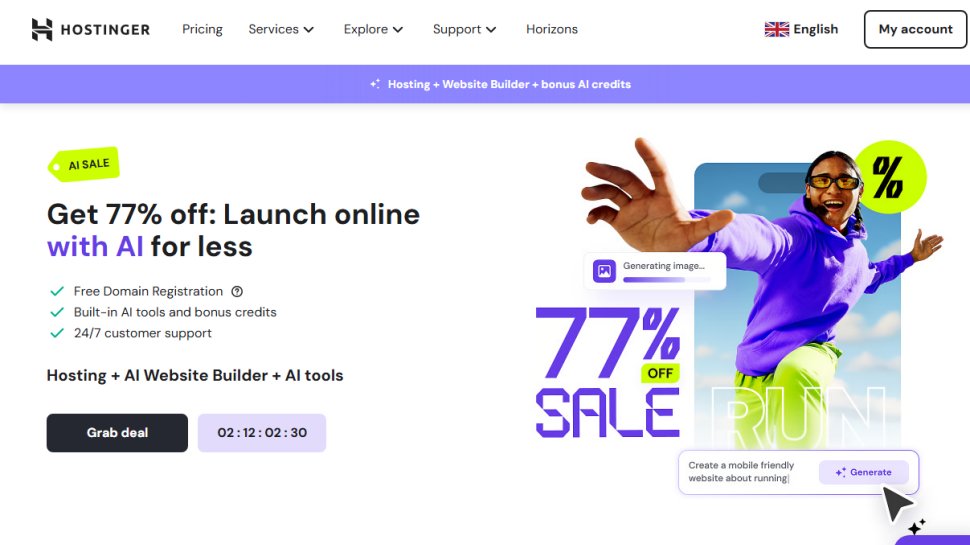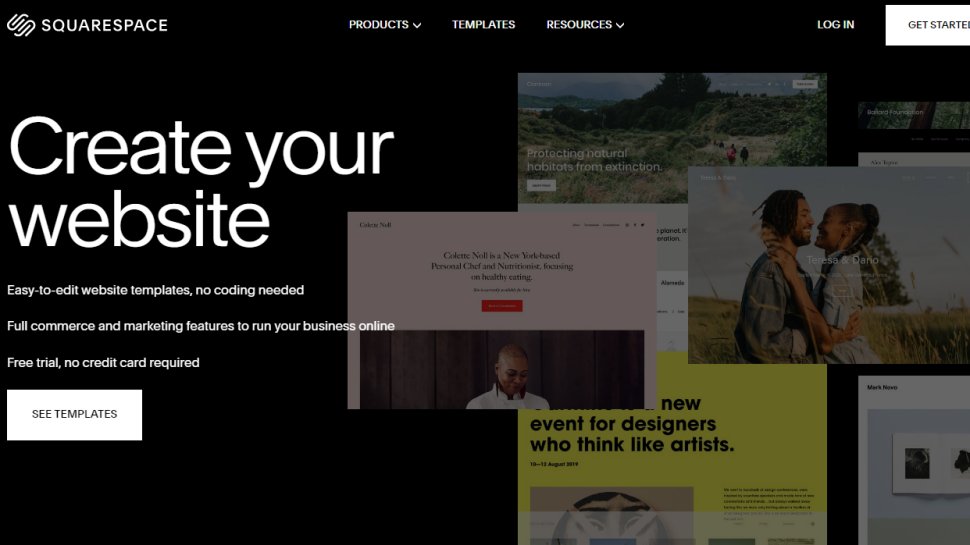The 8 best ecommerce platforms of 2026
Build and launch a successful online store with our list of the best ecommerce platforms
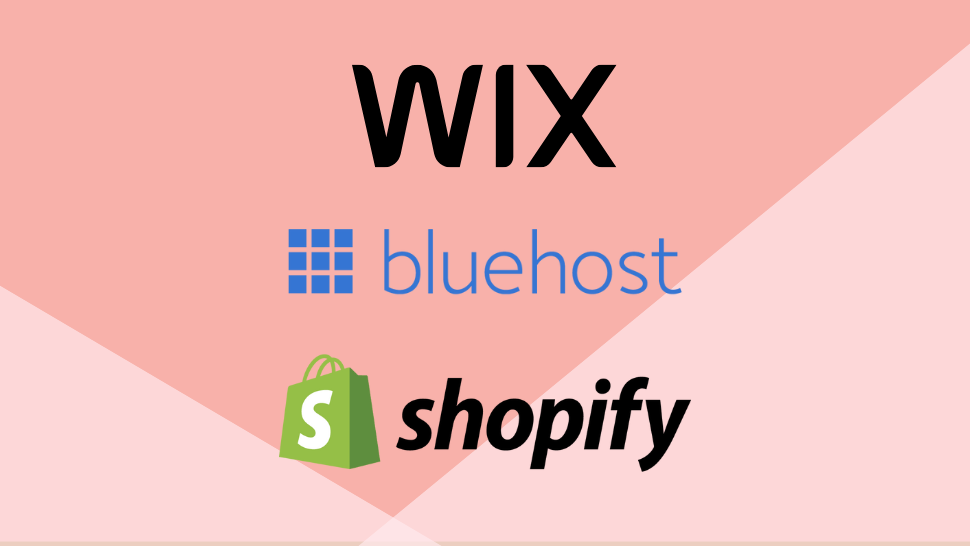
Sign up for breaking news, reviews, opinion, top tech deals, and more.
You are now subscribed
Your newsletter sign-up was successful
Revenue in the ecommerce space is projected to reach $3.4 trillion in 2026. Now, thanks to the best ecommerce platforms, it’s easier than ever for businesses of all sizes to tap into this lucrative market.
✅ 400+ hours of testing 80+ ecommerce platforms and website builders
✅ Real-world experience running online stores
✅ Expert, impartial advice and insight
✅ More than 7 years of testing the best website builders
I've built several online stores, selling everything from candles and cushions to flags and t-shirts. Over the past 7 years, I’ve put some of the best website builders through their paces, testing everything from inventory management and payment processing to email marketing and SEO tools.
Now I have created this list of the very best ecommerce platforms, to help you find the right one for you.
Wix wins the top spot. Its AI website builder makes it super easy to launch an online store, and it comes with a range of advanced ecommerce features that can be used to quickly build, launch, and grow an online store. Plans that include ecommerce features start at $29/mo.
My top 3 best ecommerce platforms of 2026
1. Best all-in-one ecommerce website builder: Wix
Wix offers everything you need to build, launch, and grow a successful online store.
Ecommerce plans start at just $29/mo and include a free domain for the first year, along with the ability to sell on marketplaces and social media.
↪ Read our expert analysis of Wix
2. Best for tapping into the power of WooCommerce: Bluehost
WooCommerce is one of the most powerful ecommerce solutions out there and Bluehost offers a smart and easy way to build a stunning website on top of it.
Dedicated commerce plans start at $14.99/mo (increasing to $21.99/mo after the into period).
It also comes with a 3-month free trial of professional email, which is ideal for getting started with email marketing.
↪ Read our expert analysis of Bluehost
3. Best for dedicated ecommerce tools and features: Shopify
With powerful ecommerce functionality, Shopify combines power with ease of use.
Get your online store up and running with 3 months at just $1/mo. Then, get unlimited products, 24/7 support, a free SSL, and more from just $29/mo.
↪ Read our expert analysis of Shopify
8 best ecommerce website builders
Why you can trust TechRadar
- Wix for most online store stores, in most cases
- Bluehost + Woocommerce for selling on WordPress
- Shopify for ambitious online stores that want no limits
- BigCommerce for big businesses with big needs
- Square for physical stores with an online presence
- Hostinger for small online stores
- Squarespace for unbeatable store design
- GoDaddy for total beginners
Ecommerce platform comparison
| Header Cell - Column 0 | Wix | Bluehost | Shopify | BigCommerce | Hostinger | Squarespace | GoDaddy |
|---|---|---|---|---|---|---|---|
Our rating | ⭐⭐⭐⭐½ | ⭐⭐⭐⭐ | ⭐⭐⭐⭐ | ⭐⭐⭐⭐ | ⭐⭐⭐⭐ | ⭐⭐⭐⭐ | ⭐⭐⭐⭐ |
Best for | Overall | Wordpress | Without limits | Analytics | Small business | Design | Beginners |
Free ecommerce plan? | No (free plan doesn’t include ecommerce features) | No | No | No | No | No | No |
Paid plans starting at | $29/mo | $14.99/mo (intro rate) | $29/mo | $29/mo | $3.99/mo (intro rate) then $18.99/mo | $19/mo | $9.99/mo |
Transaction fees (may vary from plan-to-plan) | 2.9% + 0.30 USD | Depends on payment processor | 2.9% + 0.30 USD | 2.59% + 0.49 USD | 0% (payment processors may charge a fee) | 2.9% + 0.30 USD | 2.7% + 0.30 USD |
Payment gateways | 80+ including Wix Payments, Stripe, and PayPal | 45+ including WooPayments, Stripe, and PayPal | 100+ including PayPal, Apple Pay, and Klarna | 65+ including Amazon Pay, PayPal, and Stripe | 100+ including Stripe and PayPal | Squarespace Payments, Stripe, PayPal, and Square | GoDaddy Payments and PayPal |
Ease of use | Beginner friendly | Beginner friendly | Some experience/learning required | Some experience/learning required | Beginner friendly | Beginner friendly | Beginner friendly |
Customer support | 24/7 support on live chat and email. Phone support on some plans. | 24/7 support via live chat and phone. | 24/7 support via live chat, email, and phone (depending on plan) | 24/7 support via phone, email, and live chat. | Email and live chat. | Live chat and email. | 24/7 support via phone and live chat. |
The best ecommerce platforms of 2026 in full:
The best ecommerce platform overall
Reasons to buy
Reasons to avoid
✅ You’re looking for built-in SEO tools: If you’re hoping to rank high on Google, but don’t know where to get started, Wix’s built-in SEO tools can take some of the pressure off while giving you tips and tricks.
✅ You want to try it out first for free: The free plan lets you trial the platform and all the tools it has to offer without paying a penny. Unfortunately, this comes at the cost of your site using a Wix domain.
✅ You want a platform that’s easy to use: Wix’s beginner-friendly approach renders it really easy to use, especially if you tap into its AI-powered tool, Wix ADI.
❌ You don’t want to pay over the odds for ecommerce: Although there’s a free plan, this doesn’t offer ecommerce tools; only the most premium options have ecommerce tools.
❌ You’re a big business: Larger sites might not find Wix as useful as smaller ventures given Wix doesn’t provide unlimited resources with any of its plans.
❌ You’re constantly experimenting with your site’s look: Wix’s templates are useful, but you can swap them out for another once it’s set. If you want to change template, you’ll have to build your site again from scratch.
🌐 Wix is one of the best site builders and worth checking out, despite the fact it’s not perfect. It has something for everyone – whether you’re launching a blog or a professional site to promote your business, but larger sites may wish to look elsewhere. ★★★★½
What you need to know:
Wix is one of the best all-in-one ecommerce platforms on the marker that’ll equip you with everything you’ll ever need to build a beautiful online store. It comes in the package with a web hosting service and a domain name, free or paid.
We found the ecommerce features on Wix simple and easy to use. Its simplicity makes it an ideal option for small businesses that want to quickly and easily upload products and start selling online.
Although we didn't set up a large scale ecommerce store, it is clear Wix's limited resources may prove an issue in these circumstances. If you want a platform with fewer limits, BigCommerce is worth checking out.
Plans and pricing:
Although Wix offers one of the best free website builder plans and a low cost ‘Light’ plan ($17/mo), if you want to sell online you will need to opt for one of its more advanced plans.
The cheapest plan that will allow you to sell online is the ‘Core’ plan ($29/mo). This gives you all the basics you need to build your website along with ecommerce tools such as the ability to sell up to 50,000 products, accept online payments, send abandoned cart emails, and apply automatic discounts.
Taking a step up to the ‘Business’ plan ($36/mo) will give you everything from the ‘Core’ plan along with unlocking reviews, advanced shipping options, and up to 5 additional currencies.
Business Elite ($159/mo) takes this one step further, adding a loyalty program along with more advanced versions of many of the tools you get with the lower level plans.
Wix is a great option for building an ecommerce store, but it certainly isn't the cheapest. In our Wix vs Weebly study, we found that although Wix offers better ecommerce and website builder features, Weebly is a strong competitor and costs considerably less, with premium packages starting at just $10/mo.
Ease of use:
Boasting its beginner-friendly approach, Wix is one of the easiest site builders to use, particularly if you don’t mind putting your trust in its AI-powered tool Wix ADI. In a matter of minutes, Wix ADI will build a site for you, though a basic one. So, you’ll still want to utilize the editor and touch up your newly created site.
Features:
Wix offers a cloud hosting service and a domain name with its packages. All plans come with a free SSL certificate and bandwidth is unlimited on most plans too, but storage space is sadly capped on all packages. Its ecommerce features, available with Business Basic on upwards, cover all core functionality you’d expect. Wix allows you to accept online bookings for appointments, schedule online services, manage your staff, stream videos, and much more.
Wix offers one of the best AI website builders on the market. Simply explain the online store you are looking to build and the AI will deliver a dedicated template complete with text and image. Of course, this requires some editing, but is sure to help you get your store online in no time at all. Alternatively, you can pick from one of Wix's templates and build your store out from there.
AI is also integrated across the rest of the Wix platform including everything from an AI text writer to AI image editing - both of which are super helpful for online stores that are looking to upload a high volume of products.
The Wix App Market can also add extra features and functionality to your site, with more than 500 apps on offer.This is alongside the Wix Ascend all-in-one business solution for website owners, which includes tools like email marketing, branding and SEO.
Security:
Keeping your website secure is critical, and Wix makes it simple by handling the technical stuff for you. Every Wix site comes with an SSL certificate, ensuring your visitors can browse safely with an encrypted connection. Additionally, Wix is PCI DSS compliant, which means it securely handles credit card payments, a must for any serious online store.
Wix boosts account protection by offering two-step verification, which means you'll need to enter a special code along with your username and password to access your account. You can receive this code via email, SMS, or an authenticator app, adding flexibility and extra security. Plus, the Login History page also lets you monitor account logins, locations, and dates, helping you spot any suspicious activity.
For business sites, Wix’s collaboration tool can be a lifesaver. It lets you share access with team members securely, assigning specific roles so they only have access to what they need. Plus, Wix has built-in DDoS protection, monitors your site round-the-clock, and keeps a history of your site versions, so you can easily revert to a previous version if something goes wrong.
Support:
Wix provides a 24/7 callback service and live chat support from Monday to Friday, 2 AM - 6 PM (ET). In addition to English, live chat is also available in ten other languages including French, German, and Italian. Wix Help Center offers lots of step-by-step guides you can browse via categories, or a search box – which we prefer.
Read the full review: Wix review
Find the best deals on Wix products with our Wix promo codes.
The best ecommerce platform for WordPress
Reasons to buy
Reasons to avoid
✅ You’re looking to make the most of templates: Bluehost makes it easy for people to build a website with a plethora of templates and media sources, with prebuilt designs for different components that make up the site.
✅ You need performance guaranteed: We reported no outages during testing, and response times averaged 1.95ms, which is incredibly fast, given most providers average between 200-400ms.
✅ You want to build a WordPress site: WordPress recommends Bluehost becaue of its customer service and expertise, and the platform has offered plans optimized for WordPress since 2014.
❌ You need an email account: Although there are great advantages to using Bluehost, you can’t buy an email address with its various packages.
❌ You want to pay monthly: There’s no monthly payment option for Bluehost’s website building plans, and you have the option to commit to 12 months or 36 months.
❌ You’re looking for a novice-friendly eccomerce platform: Like most open-source solutions, WooCommerce isn’t the most beginner-friendly and it isn’t included in the base plan.
🌐 Bluehost + WooCommerce work together extremely well to give you an ecommerce solution optimised for WordPress. You get complete control over your site and plenty of templates to help you get underway, alongside a great variety of ecommerce tools. ★★★★
What you need to know:
Instead of being a standalone ecommerce platform, WooCommerce is a free plugin that can turn your WordPress site into a fully functional online store. Like most open-source solutions, WooCommerce isn’t the most novice-friendly option around.
Fortunately, Bluehost simplifies the process by providing a ready-made WooCommerce platform with everything you need already installed, and that includes a shopping theme and essential plugins.
Although building an online store on WordPress can be a little daunting, we found it pretty easy when using Bluehost. However, if you are a complete novice, another option (such as Wix) may make more sense. Even with our background in testing and using website builders, we found some elements of setting up and using the WordPress platform for online selling a little confusing.
Plans and pricing:
Bluehost offers two plans for its dedicated ecommerce website builder.
The entry level Ecommerce Essentials plan come with everything you need to build and launch a great online store including secure online payments, unlimited products, and a host of dedicated ecommerce tools. This plan starts at $14.99/mo, but will go up to $21.99/mo after the the intro rate expires.
The Ecommerce Premium plan gives you everything from the Essentials plan, plus multi-channel inventory management, helping you seamlessly sell across various platforms. This plan starts at $21.99/mo, but bumps up to $30.99/mo after the intro rate expires.
Ease of use:
Bluehost provides an easy to use, intuitive drag-and-drop builder that can help you assemble a website, as well as tweak it’s appearance and add different elements in almost no time at all. The custom-built WooCommerce platform, integrated into Bluehost, also makes it as easy as possible to tap into the features that make WooCommerce so powerful.
Features:
All packages include a bevy of useful hosting essentials such as free SSL and domain name, albeit for the first year only. Hosting is included, too. The basic plan also includes free CDM, alongside 50GB SSD storage space.
The Bluehost Website Builder is built on top of WordPress, and serves to provide a more streamlined and straightforward interface for building websites using WordPress. Novice users will appreciate the drag-and-drop online store builder which lets you assemble robust ecommerce websites without any technical know-how, coding skills, or even familiarity with WordPress.
Bluehost also now offers a full AI website builder. This tool can help you quickly build and populate a dedicated online store, helping you start selling and growing your ecommerce business faster than ever before.
Security:
Bluehost provides solid security, starting with a free SSL certificate on every plan. For sites handling serious amounts of sensitive information, a premium SSL certificate is available for $49.99 per year.
Bluehost includes free security tools like Spam Assassin protection, hotlink protection, and Secure Shell access. While these cover core security needs, additional measures like SiteLock Find, which offers advanced security for ecommerce sites, can be added for $1.99/month (billed annually). These enhancements are essential for protecting an online business.
Unfortunately, PCI compliance is not automatically supported on all Bluehost accounts. Shared hosting requires a full CDN solution like Cloudflare to achieve PCI compliance, while VPS and dedicated server customers can reach compliance through a PCI scan. Also, although the core WooCommerce plugin isn't PCI-DSS certified, it's built with security in mind, and achieving PCI compliance is seen as the store owner's responsibility.
Support:
While our experience with billing and the customer support was satisfactory, a quick look at Trustpilot reveals a different story. At present, Bluehost scores a rating of 3.2 out of 5. Most of the reviews are from dissatisfied customers expressing frustration at their interaction with the technical support and questions about billing.
Bluehost used to offer a ticket-based support system but that’s been discontinued. Your only options are phone support, live chat, or scavenging for a solution on the Knowledge Base. There’s also a Knowledge Base with guides split across eight broad categories – with all guides including step-by-step instructions.
Read the full review: Bluehost Website Builder review
Check out our Bluehost promo codes to save money on your purchase.
The best ecommerce software without limits
Reasons to buy
Reasons to avoid
✅ You want no limits: Shopify doesn’t include nearly as many annoying limits or catches as you’ll get with other platforms, including unlimited product, bandwidth and disk space – alongside a free SSL certificate.
✅ You want a broad choice of extensions: The template-style builder is complemented with a rich variety of integrations and other apps, including shipping and inventory management.
✅ You need advanced analytics: Shopify’s built-in analytics offers an at-a-glance view of important business stats, with individual reports giving you more detail.
❌ You want to avoid paying a premium: Shopify’s various plans, while rich with tools and features, are on the pricy side, with the most expensive tier priced at $299 per month.
❌ You want a basic or free plan: Although the basic plan is available for a reasonable monthly fee, it doesn’t include gift cards or Shopify’s monthly reports. There’s also no free plan, but there is a 14-day trial for all plans.
❌ You’re wary of transaction fees: Transaction fees are present throughout Shopify’s packages, and apply to both credit card and in-person charges, but they scale down with more premium plans.
🌐 Shopify represents an easier way to build and manage your web store, but there are more powerful platforms around and you need to pay a relative premium when you compare it to a number of competitors. ★★★★
What you need to know:
Shopify is perhaps the most well-known and top rated ecommerce platforms as we write and it came a long way since its inception in 2006. True to its word, to use Shopify to create a beautiful online store you don’t require any technical or design skills.
It’s a one-stop ecommerce platform that provides everything you need to build and grow your web store: a template-based online store builder, comprehensive product catalog, easy payment processing, automated fulfilment via shipping apps and other integrations, inventory management, powerful analytics and more.
Plans and pricing:
The Basic Shopify plan is available for $29 (around £22.70) a month, and includes a free SSL certificate, and no limits to bandwidth, disk space or products. The only penalties come in the way of only two staff users and 2.2% + 20p transaction fees for online orders and 1.7% + 0p for in-person payments.
Upgrading to the $79 (around £61.80) Shopify account cuts online credit card charges to 1.9% + 20p, and in-person ones to 1.6%. You also get gift cards, professional reports, up to five staff accounts, and five locations. The most expensive tier is the ‘Advanced Shopify’ at $299 per month (around £234). This cuts the online credit card charges down to 1.6% + 20p, in-person charges to 1.5%, gives you up to 15 staff accounts, and can handle 8 locations. Shopify also offers a free 14-day trial, with no credit card details required.
Shopify is purpose built to support online stores, but certainly isn't the cheapest option. If you are looking for something more budget friendly, Weebly is a more affordable alternative. You can get selling online for free with Weebly, although you will have a host of limitations. Paid plans start at just $10/mo.
Ease of use:
The Shopify interface does its best to keep options to a minimum. A left-hand sidebar organises features into straightforward categories - Orders, Products, Customers, Analytics, Marketing, Discounts, Apps - while the Dashboard highlights how you should get started (add products, then customise your store). It's all very clean and simple.
One problem with this minimalist approach is it's not immediately obvious where you should look to carry out a particular task. Fortunately, a well-designed search system is on hand to point you in the right direction.
Features:
Shopify provides a full-fledged CMS users can use to manage site functionality and layout, which they can also do via Shopify’s mobile apps. A live chat function allows you to have a real-time conversation with your customers, and there’s built-in support for 3D models and videos. Plus, you get an option to create customizable storefronts on Facebook and Instagram.
Shopify also offers unlimited hosting for their stores, in-depth analytics of how visitors are using the store, and powerful marketing tools such as SEO optimization, discounts, a coupon engine, gift cards, and email marketing tools.
AI has been rolled out extensively across the Shopify platform, with a focus on making it easier and faster to build and grow online stores. Shopify Sidekick offers store owners a dedicated AI assistant that can be used to quickly execute everyday tasks such as creating discount codes and checking stock levels. Shopify Magic sees AI being integrated across the platform, making it available for use in everything from writing product descriptions to editing product imagery.
Security:
When it comes to keeping your online store safe, Shopify has you covered. All Shopify plans include SSL security, which is crucial for protecting sensitive information, like payment details, from hackers and building trust with your customers.
Shopify is also Level 1 PCI DDS compliant, which means your store meets the highest security standards for processing credit/debit card details. In other words, you can be confident that your transactions are secure and your customers’ information is safeguarded.
One of the best parts about using Shopify is that they handle all the security updates and core software maintenance for you. Your site is always up-to-date with the latest security patches without you lifting a finger. Plus, Shopify has a strong fraud detection system and sends alerts if there’s any potential security threat, so you can swiftly take action to keep your store safe.
Support:
Shopify offers round-the-clock customer support via telephone line, live chat, and email. During testing we found support to be responsive and helpful, which can be mighty helpful when faced with a challenge in setting up, running, or growing your online store.
Read the full review: Shopify review
The best ecommerce platform for big businesses
Reasons to buy
Reasons to avoid
✅ You want loads of built-in tools: The platform features customizable templates, integrated payment processing systems, built-in marketing tools, and more.
✅ You want great customer support: You can access live chat support through its website, alongside phone support and an email address you can contact – with an agent getting in touch in under 24 hours.
✅ You want to take advantage of analytics: BigCommerce offers real-time analytics, with access to experts qualified in both Google Analytics and Adwords who can offer advice.
❌ You’re just starting out: Although BigCommerce is user-friendly, it isn’t the most beginner-friendly platform out there and may seem overwhelmingly complex if you’re just starting out.
❌ You want extensive customization options: Although there are a variety of templates you pick out and customize, these are limited when you compare it to those offered by competitors.
❌ You’re looking for value-for-money: BigCommerce is fantastic if pricing isn’t an issue for you, but with a number of expensive plans, those looking to making savings should probably shop elsewhere.
🌐 BigComerce is a feature-rich ecommerce solution that’s prefect for the large businesses and enterprises – that is, if pricing isn’t an issue. With tools, customer interaction and integrations everywhere you look, you can build the perfect website to support your growing business. ★★★★
What you need to know:
Launched in 2009, BigCommerce is today one of the leading ecommerce platforms providing a splendid level of scalability for online stores – meaning it can follow and shape your business’ growth.
Much like Shopify, BigCommerce provides a variety of templates and themes to help stores look their best and get up and running quickly. Alternatively, users can design their own store or employ BigCommerce designers to do so. The platform incorporates a full-featured CMS that allows users to run an entire site, rather than just an online store.
During testing we found that BigCommerce offers all the tools and features you would expect from a dedicated piece of ecommerce software.
However, with a slightly higher level of complexity than the likes of Shopify, we also found that BigCommerce is better suited to established ecommerce brands that already have a basic understanding of how ecommerce platforms function.
Plans and pricing:
BigCommerce’s Standard plan starts at $29.95/month and includes everything you need to get started. BigCommerce Plus plan starts at $79.95/month and includes all the features in the standard plan plus a number of others including customer groups and segmentation, abandoned cart saver, and more advanced reporting tools.
The Pro plan is BigCommerce’s basic website builder package and starts at $299.95/month. It includes all the features of the Plus plan plus Google customer reviews, product filtering, and custom product filtering. It also offers online sales up to $400k per year.
Ease of use:
BigCommerce offers a robust suite of features that make it easy to build a website from scratch. The drag-and-drop builder makes it easy for users to customize their site without needing any coding skills. The platform also offers plenty of features to help you manage your store once it's up and running. You can easily add products, manage orders, process payments, track inventory levels, and more. The only downside is it might not be suitable for beginners, given the breadth of tools and features available.
Features:
Users can benefit from detailed and flexible product management, optimized search engine rankings, along with a variety of integrated marketing tools and analytics.
Payments can be accepted via over 65 pre-integrated gateways, and shipping details can be customized as per the business's requirements. As of late, some new features have been added like support for Amazon Import and Link and Shopping in Instagram Stories.
The platform offers automated order processing, flexible tax rules depending on where orders are made and shipped, and support for over 140 currencies. One of the great tools that come with BigCommerce, meanwhile, is BitPay – the world’s largest provider of Bitcoin and cryptocurrency payment services.
Security:
Keeping your BigCommerce store secure is the highest priority, and much of the heavy lifting is handled by BigCommerce itself. Features like PCI compliance, two-factor authentication, and SSL encryption are all in place to safeguard your site and transactions.
However, one aspect you'll want to pay attention to is backups. BigCommerce doesn't automatically perform backups for you, so it's smart to have a backup process in place to safeguard your store data if anything goes awry.
Fortunately, BigCommerce offers a range of security settings for both site visitors and customers. From automatically logging out customers after a certain period to enabling reCAPTCHA, you have control over the security of your online store.
Support:
BigCommerce offers live chat support directly from its website. If live chat is different from your style, BigCommerce also offers phone support for their customers. For those who prefer written communication, BigCommerce provides email support as well. All you have to do is fill out an online form on their website and one of their team members will get back to you within 24 hours (or sooner).
Read the full review: BigCommerce review
The best ecommerce platform for physical stores
Reasons to buy
Reasons to avoid
✅ You want to integrate online and in-person sales seamlessly: Square's platform perfectly syncs your physical store inventory with your online store, making omnichannel selling effortless.
✅ You need a user-friendly solution: Square's drag-and-drop website builder requires no coding knowledge, making it ideal for business owners who want to create a professional online presence quickly.
✅ You're looking for built-in marketing tools: Square offers robust marketing features including email campaigns, social media integration, and customer engagement tools to help grow your business.
❌ You want extensive customization options: While Square offers customizable templates, its design flexibility is somewhat limited compared to competitors like Wix or Shopify.
❌ You need advanced ecommerce features: Square's platform may lack some sophisticated features that larger online-only businesses might require for complex operations.
❌ You're concerned about checkout experience: Square redirects customers to a different domain during checkout, which might affect the seamless shopping experience for your customers.
🌐 Square offers an excellent ecommerce solution that bridges the gap between physical and online retail, making it perfect for businesses that already operate brick-and-mortar locations or use Square's POS system. With its straightforward approach and integrated payment processing, it provides everything needed to extend your physical store into the digital realm. ★★★½
What you need to know:
Square Online is an adaptive ecommerce platform that has been especially designed with brick-and-mortar store businesses in mind. It particularly shines at making it simple to integrate online and offline business operations, which automatically sync up inventory, sales, and customer data across channels.
The platform provides all that is needed to create a professional webstore, from product management to inventory tracking to straight-through payment processing. Square's ecosystem model enables merchants to operate their entire business—from point-of-sale to online orders—within one platform.
During our tests, we found that the Square website builder platform was best suited for retailers, restaurants, and service companies who already use the Square POS platform, who are now looking to expand their presence online without exposing themselves to complex integrations or learning essentially new systems.
Plans and pricing:
Square provides an incredibly generous free plan with unlimited products, simple search engine optimization tools, inventory tracking, and multi-channel selling features. The plan imposes a 3.3% + 30¢ transaction fee on online sales, making it an affordable option for new businesses to launch an online store.
For growing businesses, the Plus plan at $49/month (billed annually) includes all of the free stuff plus more site customization, customer accounts, personal ordering, and a free domain name for one year. The transaction fee remains 2.9% + 30¢ per sale.
The $149/month Premium plan provides the best value and additional features, including live shipping estimates, and priority support.
Square's prices are clear and upfront with no hidden costs, although companies must consider that additional fees for certain templates, apps, and Square POS functions are possible depending on individual needs.
Ease of use:
Square's store builder features a simple drag-and-drop builder that anyone without a designing background can use to build a professional online store. The platform facilitates launch by walking you step by step through simple-to-understand instructions and intuitive templates.
We particularly liked the ease of importing existing inventory from a Square POS system, which populates your online store with products, descriptions, and images with no manual effort. It significantly reduces the time it takes to set up an online store for businesses already committed to Square's ecosystem.
Features:
Square Online has features that are specifically meant for both online and offline stores. The website has feature-rich product management where you can add unlimited products with various images, in-depth descriptions, and variations.
The inventory sync feature automatically synchronizes the inventory levels in all the sales channels, preventing over-selling and providing real-time inventory visibility. Square also accommodates customizable types of fulfillment like shipping, local pickup, and curbside pickup.
Marketing features encompass Facebook and Instagram Shop integration, email marketing, and customer engagement. Square's artificial intelligence features enable personalized shopping experiences with product suggestions to customers and simplified reordering features.
For foodservice businesses, Square provides specialized functionality including online ordering, QR code menus, and delivery management capabilities that can easily be integrated with kitchen operations.
Security:
Security receives the highest priority with Square. SSL certificates are a default feature of every Square Online site, encrypting customer data and keeping it secure when making a transaction.
Your website stays PCI compliant, ensuring industry standards for the secure handling of credit card data. Square's payment processing system has fraud detection and prevention features integrated into it so businesses are safe from fraudulent transactions.
Square also offers secure customer accounts that allow customers to save payment information securely for faster checkout procedures. Two-factor authentication adds a layer of security for store owners when accessing the backend system.
Support:
Square offers good support facilities too. The knowledge base contains detailed guides, tutorials, and troubleshooting information on each aspect of how to install and operate an online shop.
All users have email support backing them, with phone support available for Plus and Premium subscription holders. Additionally, Square also maintains a forum where users can interact with each other on ideas and solutions.
For businesses on Premium plans, Square provides priority support with faster response times and dedicated handling of more complex problems. Support personnel are generally familiar with the online platform as well as how it integrates into Square's broader product line.
Read the full review: Square website builder review
Best ecommerce platform for small business
Reasons to buy
Reasons to avoid
✅ You're launching on a tight budget: Hostinger's Business plan starts at just $3.99/mo, making it one of the most affordable ecommerce solutions available without sacrificing essential features.
✅ You want to maximize profit margins: With 0% transaction fees, you keep every penny of your sales, unlike competitors like Shopify or BigCommerce that charge 2-3% per transaction on top of payment processor fees. This can save you hundreds of dollars monthly on a growing store.
✅ You need a store online fast: Hostinger's AI website builder can generate a fully functional online store in minutes, complete with products, descriptions, and images based on your business description.
❌ You're planning to sell lots of products: The Business plan caps you at 1,000 products, which may be limiting for larger inventories or businesses planning significant expansion.
❌ You require immediate phone support: Hostinger only offers live chat and email support. If you prefer resolving complex issues over the phone, you'll need to look elsewhere.
❌ You need enterprise-grade features: While suitable for small to medium stores, Hostinger lacks some advanced features like subscription billing and product bundles that larger ecommerce operations may require.
🌐 Hostinger delivers excellent value for budget-conscious entrepreneurs looking to launch an online store without breaking the bank. With its AI-powered tools, 0% transaction fees, and PCI-DLSS compliant payment integrations, it's an excellent choice for small businesses that want professional functionality at an affordable price. However, enterprise store owners may eventually outgrow some of its limitations.
What you need to know
Hostinger has made significant waves in the ecommerce space by offering a complete online store solution at a fraction of the cost of competitors - making it ideal for small businesses.
The platform combines traditional web hosting expertise with a modern AI-powered website builder specifically designed for ecommerce.
There’s a commendable dedication to offering genuine ecommerce capability at budget-friendly prices. Rather than just offering a basic website builder, Hostinger provides a fully-featured online store solution with integrated payment processing, inventory management, and AI-powered tools to help you get selling.
We found Hostinger's AI website builder quite effective at creating professional-looking store designs during testing. The system generates not just the layout, but also relevant content and images based on your business description. While you'll still want to customize and refine the results, it dramatically reduces the time needed to launch an online store.
Hostinger is particularly well-suited for first-time store owners, solopreneurs, and small businesses that don’t want to pay exorbitant transaction fees or subscribe to a bunch of features they’ll never use. However, larger businesses with massive product catalogs or those requiring subscription billing may find themselves constrained by some of the limitations.
Plans and pricing
Hostinger offers two website builder plans, but only the Business plan includes ecommerce functionality.
The Business plan starts at an incredibly competitive $3.99 per month when billed for 48 months, though this is an introductory rate that renews at $18.99 per month. Even at the renewal rate, Hostinger remains significantly cheaper than most competitors.
For comparison, Shopify's basic plan costs $29/month, BigCommerce’s starting plan is $29/month, and Squarespace’s ecommerce plan starts at $23/month. Hostinger's pricing gets you substantial savings, especially for newer businesses that need to watch every dollar.
What you get with the Business plan is impressive for the price. You can sell up to 1,000 products with unlimited bandwidth, accept payments through 100+ payment gateways, including Stripe and PayPal, and importantly, pay zero transaction fees. This last point is particularly important since many competitors charge 2-3% transaction fees on top of their subscription costs and payment processor fees.
Ease of use
Hostinger offers two paths to building your store: using the AI website builder or selecting from 150+ pre-designed templates.
The AI approach is remarkably simple. You describe your business in a few sentences, and the AI generates a complete ecommerce site with relevant content, product layouts, and imagery. We found that this feature worked much better than expected during testing. While the initial results always need refinement, it provides an excellent starting point that would take hours to create manually.
If you prefer more control from the start, Hostinger's template library offers designs specifically optimized for ecommerce. All templates are mobile-responsive and can be customized using the intuitive drag-and-drop editor.
Adding products is straightforward. You can manually enter product details, bulk upload via CSV, or use Hostinger's AI product description generator. Then, the store management dashboard provides easy access to orders, inventory tracking, customer data, and analytics. Everything is clearly organized, making it simple to manage your online business even without prior ecommerce experience.
Features
Hostinger packs a surprising number of ecommerce features into its affordable Business plan. It includes a fully-featured online store system that supports both physical and digital products, with inventory tracking, product variations, and category management. Its new AI tools are also some of the finest among beginner-friendly competitors. Beyond the AI website builder and product description generator, you also get an AI writer for creating marketing copy, an AI logo maker, an AI image generator, and 5 other AI tools.
For payments, Hostinger integrates with over 100 payment gateways, including major providers like Stripe, PayPal, Apple Pay, and Google Pay. It includes built-in sales tax calculators that automatically handle tax calculations for different regions, while ecommerce analytics help you track performance and make data-driven decisions. Shipping integrations include options for flat rate, free shipping, or calculated rates based on weight and destination. You can create custom shipping zones and offer different shipping methods to customers.
Since September 2025, Hostinger has also integrated with Printful to enable print-on-demand selling without holding your own inventory. A great way to monetize your brand with some extra merchandise or even launch a dedicated product design business.
For marketing, Hostinger includes SEO tools to help your store rank in search engines, integration with Google Analytics for detailed traffic analysis, and the ability to create discount codes and promotional campaigns. The platform also supports selling across multiple channels, though functionality is more basic compared to dedicated ecommerce platforms.
The major limitation is the 1,000 product cap on the Business plan. You also won't find more advanced features like subscription billing, product bundles, or abandoned cart recovery that some larger ecommerce platforms offer.
Security
Every site includes a free SSL certificate that's pre-configured on purchase, encrypting data transmitted between your store and customers' browsers. This is a must for protecting payment information and complying with financial regulations.
For payment processing, Hostinger works with PCI DSS-compliant payment processors like Stripe and PayPal. This means you're not directly handling sensitive payment card data; the payment processors handle this according to industry security standards.
The Business plan also includes daily automatic backups, so your store data is regularly saved and can be restored if anything goes wrong. Hostinger even provides DDoS protection, malware scanning, and a Web Application Firewall (WAF) to guard against attacks that could take your store offline.
There’s a 99.9% uptime guarantee backed by Hostinger's SLA. Thanks to LiteSpeed caching and the Cloudflare CDN, speed and performance tests received satisfactory results across different testing locations and devices.
Support
Customer support is available 24/7 through live chat and email, with response times typically under 3 minutes per Hostinger’s own claims. The company also provides an AI assistant called Kodee that can handle common questions and guide you through basic tasks.
During our tests, we found the live chat support responsive and generally helpful. Agents were patient and provided step-by-step guidance for the questions we asked. While we weren’t able to test the support experience for users who speak other languages, Hostinger says it offers support in 8+ languages.
There’s also a very sizable knowledge base with tutorials, video guides, and step-by-step articles covering everything from initial setup to advanced configurations.
The quality of these resources is high, with clear instructions and screenshots. Sadly, though, there’s no phone support for immediate communication on urgent issues. For those relying on the AI support assistant, the experience can be a bit frustrating for complex queries.
Read the full review: Hostinger Website Builder review
The best ecommerce platform for shop design
Reasons to buy
Reasons to avoid
✅ You're new to website building: Squarespace's good-looking templates and user-friendly drag-and-drop interface make it perfect for those new to website creation, requiring no coding skills at all.
✅ You require diverse template options: With over 100 mobile-responsive templates available, Squarespace offers a wide range of options suitable for various purposes.
✅ You seek scalability and support: Squarespace offers unlimited bandwidth and storage, along with integrated ecommerce features, giving your growing business the solid support it needs to handle more traffic and transactions.
❌ You plan to sell in multiple currencies: Squarespace's transaction fees and lack of support for selling in multiple currencies may not be suitable for businesses operating in diverse markets.
❌ You prefer telephone support: Squarespace's customer support options do not include telephone support, which may be a drawback for users who prefer direct assistance.
❌ You want extensive customization choices: While Squarespace offers a solid set of features, its customization options may be limited for users with specific design needs or branding requirements.
🌐 Squarespace is a standout option, especially if you're looking to create an eye-catching website with minimal fuss. We particularly enjoyed its vast array of beautiful templates and its intuitive interface, which made the whole website-building process a breeze.
While it might not offer as much customization as some other platforms, Squarespace more than makes up for it with its comprehensive feature set and reliable support. So, if you're in the market for a website builder that prioritizes design and user-friendliness, Squarespace is worth a shot.
What you need to know:
Squarespace is a one-stop solution for all things website-related. Whether you're looking to catch a domain, host your site in the cloud, or build a stunning online store, Squarespace has got your back. What's best is that you don't need to be a tech whiz to make a beautiful yet professional website - their user-friendly system and drag-and-drop interface make it surprisingly simple.
Although Squarespace offers some of the most stunning website templates on the market, there are limits on how far these can be customized. In our Wix vs Squarespace study, we found that Wix is a better option if the ability to edit and change your website's look and feel is important.
Pricing and plans:
When it comes to pricing, Squarespace offers four distinct plans, starting from $16 and going up to $53/month, with options for annual billing for those who prefer it. However, you can save big on these by using one of our Squarespace promo codes at checkout. Regardless of the plan you choose, you'll get essential features like unlimited bandwidth and storage, along with a complimentary custom domain.
It's worth noting that the "Business" plan carries a 3% transaction fee on sales, which could impact businesses with growing sales volumes. However, if you opt for the Commerce (whether Basic or Advanced version), you'll enjoy the benefit of no transaction fees, which makes it a solid choice for businesses focused on sales.
Ease of use:
Squarespace prides itself on its user-friendly approach, making website building a breeze for both beginners and seasoned pros. With its drag-and-drop interface and a wide selection of pre-designed templates, crafting a professional-looking website is as simple as it gets.
However, if you're thinking of switching templates down the line, be prepared to start from square one, as there's no way to seamlessly transition between them.
Features:
As we delved into Squarespace's feature set, we were glad to discover a wide array of tools designed to elevate your website. From media marketing functionalities to seamless ecommerce integrations, Squarespace truly has it all. Plus, the robust analytics tools provided allow you to stay on top of your site's performance without much effort.
Squarespace's Blueprint AI website builder can help you quickly create a stunning website via the power of AI, helping you to get selling faster than ever before.
It's worth mentioning that while you have the freedom to add unlimited products to your online store and leverage SEO and social media marketing features, some functionalities, such as manual payments and multi-currency selling, may not be as comprehensive as those offered by competitors like Shopify.
Security:
Squarespace will keep your website and its visitors safe with a robust lineup of security features. Each Squarespace site comes equipped with SSL certificates, two-factor authentication, a defense against denial of service (DoS) attacks, page passwords, and a login activity panel. We should note that the login activity panel won't single-handedly shield your site but it provides insights into any suspicious login attempts.
To ensure round-the-clock protection, Squarespace's security team monitors all sites for potential threats and vulnerabilities. If you run into a potential vulnerability, you can report it to the security team, who will promptly investigate the matter.
Additionally, Squarespace Payments and its payment processors - Stripe, PayPal, and Square - comply with applicable PCI standards, ensuring secure transactions for both you and your customers.
Support:
If you ever find yourself in need of assistance, rest assured that Squarespace has your back with a range of support options. Whether you prefer reaching out via live chat, email, or social media channels, help is always just a click away. We particularly appreciated the availability of live chat support during the workweek, which ensures prompt assistance in case of trouble.
Additionally, Squarespace's well-stocked Help Center, complete with video guides and a bustling community forum, offers valuable self-service solutions. However, it's worth noting that if you prefer resolving issues over the phone, this option isn't currently available.
Read our full review: Squarespace website builder review
Best ecommerce platform for beginners
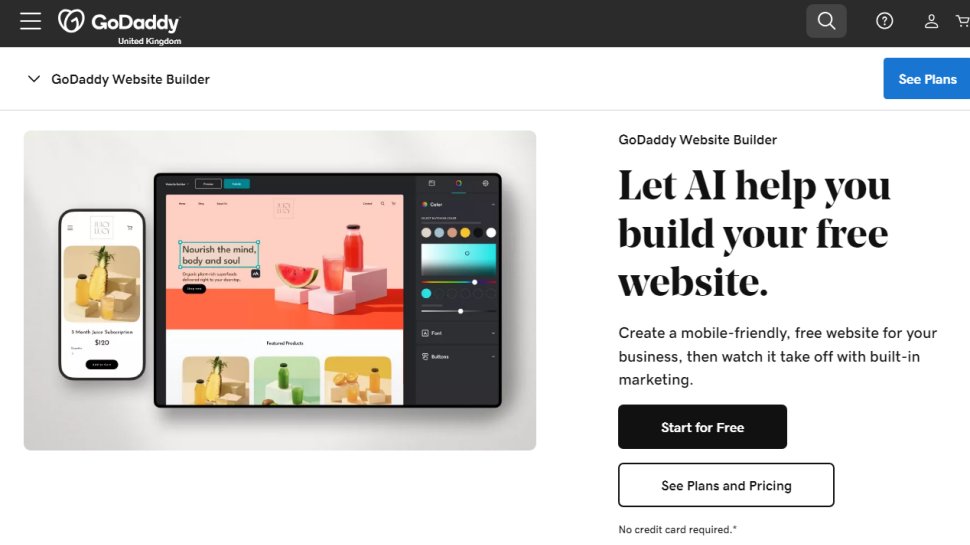
Reasons to buy
Reasons to avoid
✅ If you're a startup eager to get your online store up and running swiftly: GoDaddy's user-friendly ADI tool makes the process a breeze.
✅ You’re seeking simplicity and convenience: GoDaddy's ADI feature lets you create a website by answering a few questions, which is perfect for those who want to skip the complexities of extensive customization.
✅ You want built-in marketing tools to boost your online presence effortlessly: GoDaddy's got you covered with great options for email campaigns and performance analysis.
❌ You crave full control over your website's design and layout: GoDaddy's ADI approach will likely feel limited in terms of creative freedom.
❌ You seek advanced ecommerce features: While GoDaddy's platform is easy to use, it may lack the depth and customization options found in competitors like Squarespace and Shopify.
❌ You want a seamless checkout experience for your customers: GoDaddy's ecommerce solution redirects customers to a different domain during checkout, which could raise trust and branding concerns.
🌐 GoDaddy's website builder, powered by ADI, offers a quick and easy way for startups and small businesses to establish an online presence. We appreciated its intuitive interface and handy marketing tools, making it a solid choice for those looking for simplicity.
However, we found its limitations in creative control and ecommerce features might not suit everyone's needs, particularly those with more complex requirements or larger-scale businesses.
What you need to know:
Founded in 1997 and renowned for its domain registration, GoDaddy also offers a rock-solid website builder solution. With a user-friendly interface and competitive pricing, this website builder is an attractive option, especially for newcomers diving into the world of online presence creation.
Whether you're already a GoDaddy customer or exploring options for your website, we believe GoDaddy's easy-to-use website builder is worth considering. However, if you need extensive ecommerce tools and feature, an alternative such as Shopify may be a better fit for you.
We have also compared Wix vs GoDaddy. Our tests found that although Wix certainly offers a more complete and editable platform, GoDaddy delivers all the features you need to create a simple, yet effective online store - all at a significantly more budget friendly price.
Pricing and plans:
From individuals to small businesses and all sizes of ecommerce ventures, GoDaddy offers flexible options. We also appreciated the inclusion of a free plan, allowing users to test the platform before committing to a paid subscription.
Starting at $9.99/month, the Basic plan includes essential features such as SSL, custom domain connection, and customer support. If you need more flexibility, the Standard plan, priced at $10.49/month, offers increased email and social media limits, along with built-in SEO options.
For those seeking even more features, the Premium plan, priced at $14.99/month, supports unlimited social media platforms and posts, along with appointment scheduling and reminders. Meanwhile, the Ecommerce plan, starting at $16.99/month, provides solid features for online selling, including product listings, flexible payments, and promotional tools.
It is worth noting that the rates we quote above are introductory rates and will increase once your plan automatically renews, so it is worth checking what you will pay after the introductory period is over.
However, while GoDaddy's pricing is competitive, we found that some features may be lacking compared to other providers in the market.
Ease of use:
Our experience with GoDaddy's website builder revealed its user-friendly nature, making it ideal for individuals with limited website-building experience. Powered by artificial design intelligence (ADI), GoDaddy simplifies the website building process, guiding users through customization options effortlessly.
However, we did notice that the use of ADI limits creative freedom, and the design templates may feel somewhat rigid for users seeking more customization options.
Features:
GoDaddy's website builder offers a solid suite of business tools, including appointment scheduling, email marketing, social media management, graphic design, and CRM functionalities. We particularly liked how these integrated tools made it easier to manage different aspects of our website and marketing efforts in one place.
However, it's important to note that while these tools are effective for basic needs, users requiring more advanced features may find them lacking compared to specialized platforms. Additionally, we found that the builder's design customization options are somewhat limited, which may restrict users seeking a high level of creative control over their websites.
Moreover, we observed that the availability of app integrations is relatively restricted, which could pose challenges for users looking to extend the functionality of their sites beyond the built-in features. Despite these limitations, we found GoDaddy's website builder to be a user-friendly option for start-ups and small businesses seeking a comprehensive online solution.
GoDaddy Airo is another great solution for beginners. This platforms helps small businesses leverage the power of AI to create a full set of business assets, including logos, social media plans, and a fully populated website.
Security:
GoDaddy prioritizes strong security across its plans, providing robust features such as SSL encryption to safeguard customer transactions and data privacy. All website builder plans include SSL certificates, which encrypt data transmitted between the server and the visitor's browser, keeping it confidential.
The Ecommerce plan includes PCI-compliant solutions such as GoDaddy Payments, Online Store, and Online Appointments, enhancing security. Adhering to PCI standards ensures that customer payment information is protected, building confidence and credibility. By focusing on security, GoDaddy helps businesses gain trust and credibility, which are crucial for building long-lasting customer relationships and growing their business.
Support:
At GoDaddy, users can expect comprehensive support options tailored to their needs. The knowledge base features helpful how-to videos and guides, complemented by round-the-clock customer support, an active community forum, and informative blog posts.
You have access to live chat support, which initially connects you with a chatbot and then transfers you to a human agent if further assistance is required. Additionally, you can contact GoDaddy via phone support, with toll-free numbers available in select countries.
From what we've observed, GoDaddy aims to deliver timely support, but the response times may vary depending on the volume of support requests.
You can save on your GoDaddy subscription with our GoDaddy promo codes.
Read the full review: GoDaddy website builder review
Meet the author

Owain has an extensive background in business and marketing. He has spent over 7 years testing website builders, building his own ecommerce stores, and writing about business and marketing topics. Owain has also built several online stores, including a Scandi-inspired homeware store.
How to choose the best ecommerce platform for you
In today's fast-paced online marketplace, finding the perfect ecommerce software can be your business's best buddy. However, with so many choices out there, it's critical to think about what you really need to ensure this platform aligns with your business goals and needs. To cut to the chase, here are a few things you'll want to consider before selecting an ecommerce platform for your business:
1. Tools and functionality
When evaluating ecommerce solutions, keep an eye out for essential tools like SSL certification, fraud prevention, data backups, and PCI compliance. These are the foundation stones that ensure your customers' data remains safe and secure.
To boost your site's visibility, seek out platforms that offer SEO-friendly features such as customizable meta descriptions, integrated blogging capabilities, and customer review functionalities. Additionally, prioritize platforms that embrace responsive web design, ensuring seamless access across all devices.
To steer your business in the right direction, look for platforms that provide built-in analytics features, allowing you to track store performance and spot emerging trends. Consider platforms that support multiple selling channels, from social media platforms like Facebook Messenger to established marketplaces like Amazon, to expand your market reach and revenue streams.
Lastly, opt for platforms that offer extensive integrations and plugins, empowering you to customize and enhance your store's functionality as your business evolves. Also, having active community support can provide ongoing improvements and swift issue resolution to keep your ecommerce venture ahead of the curve.
2. Price and costs
While open-source software may appear budget-friendly upfront, it's crucial to weigh in other expenses like the fees of the best web hosting providers, security compliance, and ongoing maintenance. Also, keep an eye on transaction fees, as they can significantly spike up your overall costs.
On the flip side, subscription-based platforms may require a monthly fee, but they often include maintenance and support services, making them a cost-effective option in the long run. Don't forget to consider your budget and future growth plans when evaluating the pricing models of ecommerce software.
3. Security
With the increasing prevalence of online threats, security is more important than ever, especially for ecommerce software. When selecting a platform, it's crucial to prioritize security features like SSL encryption, data encryption, and tools to prevent fraud. Make sure the platform you choose is committed to protecting your customers' data and regularly updates its security measures to keep up with evolving threats.
After all, safeguarding your business from cyber threats is crucial for building trust and maintaining a successful online presence.
4. Ability to grow your store
Scalability is essential for the long-term success of your ecommerce business. Choose a platform that offers features tailored to accommodate your business's expanding needs, such as flexible infrastructure, customizable designs, and seamless integrations with third-party applications.
Additionally, consider platforms that support omnichannel marketing strategies, which will allow you to reach customers across multiple channels and boost sales.
All in all, picking the best ecommerce software is a bit like putting together a puzzle - you need to find the pieces that fit perfectly. By considering your needs and priorities, you'll be able to pick out a platform that helps your online business grow and thrive.
How we tested the best ecommerce platforms
Testing out website builders thoroughly is our mission, and here's how we test ecommerce platforms to find the best one:
Sign up for the ecommerce platform
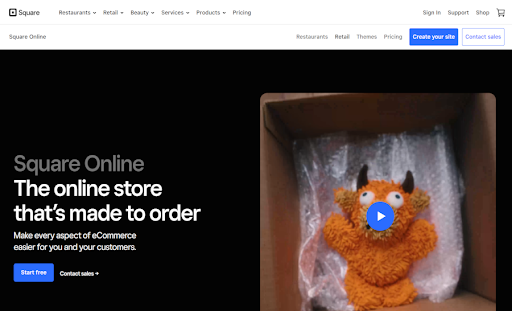
We begin by signing up for the chosen ecommerce platform, in this case, Square One. This initial step allows us to gain access to the platform's dashboard and explore its features and functionalities firsthand. During the signup process, we pay close attention to the ease of registration and any initial setup requirements.
Build a test site
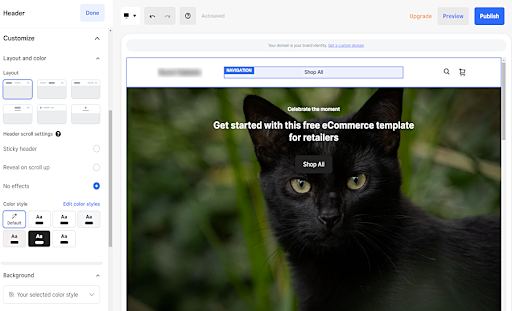
Once signed up, we go on to build a test site on the platform. This involves creating a simplified version of an ecommerce website to check the platform's ease of use and customization options. We examine available templates, elements, and page layouts to rate the flexibility and creativity offered by the platform's builder.
Explore and test ecommerce features
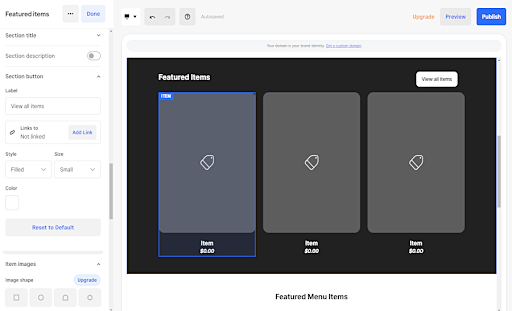
Next, we delve into the ecommerce features offered by the platform. This includes examining payment options, product management tools, checkout processes, shipping settings, and more.
Desk research
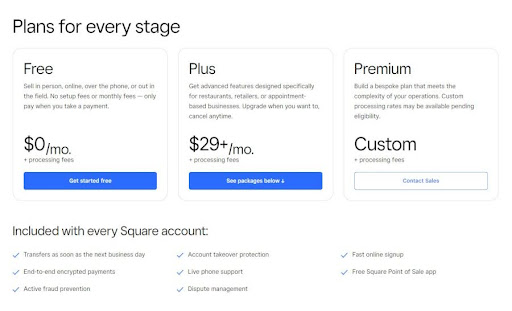
Aside from our hands-on testing, we also dive into desk research to gather more insights into the platform. This means looking into its pricing plans and any potential hidden fees or limitations. We also explore the platform's security measures, such as SSL certification and PCI compliance.
In the end, we compare the platform to its competition, focusing on ease of use, features, pricing transparency, customer support, and scalability. Our recommendations and insights aim to help you choose the right ecommerce platform for your online business.
Best ecommerce platforms: Summary
In our search for the best ecommerce platforms, we've discovered that simplicity, functionality, and standout design are crucial.
Wix stands out as an all-in-one solution, perfect for newcomers with its intuitive interface and comprehensive features. WooCommerce, while a WordPress plugin, offers robust ecommerce capabilities when paired with web hosting from Bluehost, simplifying the setup process. Finally, Shopify shines as a powerhouse platform, providing everything needed to create and grow an online store without requiring advanced technical know-how.
Whether you're a novice or a well-versed entrepreneur, consider factors like hosting options, technical proficiency, and desired store features when choosing the best platform for your ecommerce venture. If you’re ready to dive in, explore your top picks with free trials or money-back guarantees to find the perfect match for your online project.
Best ecommerce platforms FAQs
What is an ecommerce platform?
An ecommerce platform is a piece of software that allows individuals and businesses to create and manage online stores, enabling them to sell products and services across the internet. These platforms handle everything from displaying your products to processing payments and managing orders, making it easier for your online store to prosper among many competitors.
Additionally, these platforms come packed with tools for website design, marketing campaigns, and tracking analytics, empowering businesses to create a compelling online presence and attract customers.
What types of ecommerce platforms are there?
When it comes to picking an ecommerce platform, you've got three main types to choose from:
1. Open-source software: If you possess technical know-how with an in-house development team, this option gives you complete control and flexibility.
2. Software as a service (SaaS): These platforms are perfect if you want to hit the ground running without dealing with software building or maintenance. They're beginner-friendly but also pretty flexible for your in-house techies and often come with handy API libraries.
3. Headless ecommerce: With these types of platforms, you can separate the shopping cart from the content management system, offering you tons of flexibility for future front-end changes. It's a popular choice right now because it gives you control over marketing, sales, and product assets while still offering flexibility on the front end.
Each type of platform has its pros and cons and is suited to different business needs. So, consider your requirements carefully before making a choice.
Should I start an online store or sell via a marketplace (Amazon/Etsy)?
Building your own online store and selling via a marketplace both have their own unique advantages and disadvantages.
Marketplaces
Marketplaces typically come with a built in audience. Although you will still compete with others offering similar products on your marketplace of choice, it is typically easier to start driving sales on these platforms than it is on your own website.
Amazon, Etsy, and other top marketplaces also offer a host of useful tools that can help you source, market, and ship your products easily.
However, marketplaces also typically charge fees for using them, which can be avoided if you build your own website.
Websites
Websites also offer you more control. For example, you can match the look and feel of your site to your brand and develop personalised customer journeys.
Although you will need to build your own audience, you can also maintain more ownership over their information. For example, you can gather data on your website for remarketing via a pixel or collect email addresses for email marketing.
Which is best for your business?
Small and start up businesses will typically benefit more by leveraging the ready-made audience of a marketplace, helping them get those all important first sales. Businesses that are selling higher volumes of products will typically benefit from the lower fees and flexibility of a website builder.
Many businesses opt for both.
Which ecommerce platforms are like Shopify?
Shopify is a purpose built platform for ecommerce websites. If you are looking for something dedicated like Shopify your best options are BigCommerce or Square. Both of these platforms are also purpose built for ecommerce businesses, offering plenty of tools and features for managing stock, promoting your store, and taking payments.
Square is more affordable and integrates well into Square’s Point Of Sale (POS) system, making it one of the best small business website builders. In contrast, BigCommerce tends to appeal more to enterprise level businesses, with advanced analytics and collaboration tools.
What hidden fees do ecommerce platforms have?
Hidden fees can seriously impact your business profits. Taking some time to research potential hidden fees will help you better plan and budget.
Almost all ecommerce platforms will charge a transaction fee when you make a sale. Usually, this will be a percentage of the sale along with a small flat fee (such as 2.5% + $0.20). Some platforms will adjust the amount they charge based on the plan you are on, this can often make more expensive plans cheaper in the long run for stores that make a high volume of sales.
Third party payment processors such as PayPal will also charge you a fee when you take a payment through its platform. This may be in addition to fees charged by the ecommerce platforms. However, this isn’t always the case. For example, when you take a PayPal payment through Wix, you are only charged a fee by PayPal, not Wix. If you sell internationally, you will also want to understand any currency conversion fees.
Ecommerce platforms are generally transparent about what you get with each plan. However, you will sometimes find specific features and tools behind a paywall that you didn't expect. For example, almost all ecommerce platforms will offer a level of website analytics in all plans, but once you dig a little deeper you may find that more advanced plans offer a much greater level of data collection and insight.
App stores and third-party plug-ins are a great way to extend the functionality of your store. Although many of these will come with a free trial or a basic free plan, to unlock advanced features you will likely need to sign up to a subscription. For most apps and plug-ins these subscriptions are very affordable, but can add up when multiple apps are added at one time.
Although some ecommerce platforms will offer you a free custom domain with your website plan, the fee-free period typically only lasts one year. Upon renewal, you will be charged for your domain, so it is important to build this into your financial planning.
Some additional fees you may incur when using an ecommerce platform include fees for additional bandwidth or storage, security and compliance costs, and refund or chargeback fees.
All of these fees are to be expected when running an ecommerce business. However, failure to note and understand them can lead to an unforeseen impact on your business profit over the years.
How long does it take to launch an ecommerce website?
If you're aiming for a simple online store with standard features and a template-based design, you might be up and running within a few weeks to a couple of months. However, if you're dreaming of a fully customized website with unique design elements, advanced functionality, and many integrations, be prepared to invest anywhere from three to six months or more. If you're tackling a large-scale enterprise project with complex requirements, it could take over a year to bring your idea to life.
In short, the time needed to build an ecommerce website depends on multiple factors, including its complexity, required features, chosen platform, and customization level.
What are the best ecommerce platforms?
Wix is the best ecommerce platform for most online stores. It offers a huge range of powerful ecommerce solutions as well as a helpful AI website builder and other AI-powered tools that help you get your store online and growing quickly. Plans with ecommerce plans start at $29/mo, making it very affordable.
Larger online stores may benefit from opting for a dedicated ecommerce platform such as Shopify or BigCommerce. Both of these will let you sell online from $29/mo and deliver a larger range of ecommerce tools, although also come with a steeper learning curve.
Will I be charged transaction fees?
You may be charged a fee for each sale you make using some of the ecommerce platforms we recommend above. However, transaction fees are typically only charged on free and low-cost plans. If you opt for a higher level plan this will usually also include the benefit of the removal of transaction fees.
Whether a lower priced/free plan with transaction fees or a premium plan without transaction fees is right for you will depend on how much you plan on selling through your website. Almost all dedicated online stores will benefit from paying a higher subscription fee to remove transaction fees.
What level of customer support is available with ecommerce platforms?
Each ecommerce platform will offer different types of customer support. This usually includes one, or several methods of communication, including forums, email, phone, and live chat.
You may also find that different plans from the same ecommerce platform come with different levels of support. For example, you may get email support on a basic plan, but get 24/7 phone support on a top of the range plan.
It is important to understand what support you will be able to access before picking a plan. Even though premium support usually costs more, if you are a beginner, or you run a fast paced ecommerce store, being able to access top quality support quickly can pay dividends in the long run.
In this guide, we provide you with a brief overview of the types and level of support each ecommerce platform offers.
What are potential challenges I should be aware of when launching/running an ecommerce website?
Launching and running an eCommerce website comes with its set of challenges you should be aware of:
1. Choosing the right products or services: Selecting the right products to sell online is crucial for ecommerce success. This step covers researching market demand, analyzing competition, and identifying profitable niches.
2. Identifying your target audiences: Understanding your target audience's needs, preferences, and behavior is critical for coming up with effective marketing strategies.
3. Developing effective sales and marketing messages: Crafting compelling sales and marketing messages that resonate with your target audience can help drive traffic and sales to your online store.
4. Allocating digital marketing budgets: Determining how to allocate your digital marketing budget across various channels such as social media, search engine optimization (SEO), and paid advertising is essential for maximizing your return on investment (ROI).
5. Building social proof for your business: Building trust and credibility with potential customers through social proof elements such as customer reviews, testimonials, and social media engagement can help increase sales and conversions.
6. Designing an eye-catching yet user-friendly online store: Creating a user-friendly and intuitive ecommerce website design that provides a seamless shopping experience for customers is a must.
7. Increasing conversions: Implementing conversion rate optimization (CRO) strategies such as optimizing product pages, improving checkout processes, and offering personalized recommendations can help boost conversions and sales.
8. Improving customer retention: Implementing strategies like loyalty programs, personalized communication, and splendid customer service is crucial for long-term ecommerce success.
9. Mastering logistics management: Effectively managing inventory, order fulfillment, and shipping logistics to ensure timely delivery and customer satisfaction is essential.
10. Keeping your ecommerce site secure: Ensuring customer data protection, fraud prevention, and transaction security through SSL encryption, PCI compliance, and regular security audits is crucial for maintaining customer trust and credibility in the long run.
While it’s impossible to foresee everything, by considering these common challenges in ecommerce, you'll be better prepared to navigate the complexities of running a successful online store.
Can I create my own ecommerce solution?
Of course, if you want complete control over every aspect of your new online store, building each page yourself will be the best course of action.
Hiring someone to code your website is one option. If you decide to do this, follow these steps:
1. Ask the company for live examples of their work to look at;
2. Write a detailed brief of the site you want to be created. The more detail the better to avoid confusion;
3. Ensure you understand the price you are being charged and how many revisions this price includes;
4. Always have a signed agreement or contract before work commences;
5. Ask whether the designers will host your site and if you will be able to make updates yourself or if all updates must go through the design agency at an additional cost;
6. Ask for the copyright of your design to be assigned to your company, as your website is an important part of your business' intellectual property;
7. Put into your contract, details of how the agreement can be amicably dissolved if things go wrong.
Also, you don't have to build your site completely from scratch. Buying a template can give you all the basic pages your site needs. You can then either modify them yourself using an application like Dreamweaver or hire a coding expert to make the changes. Website templates are available from a number of vendors including Template Monster.
If you already have a website and want to add ecommerce functionality, this can be easily achieved with applications such as XCart, Kryptronic, and CubeCart.
Sign up to the TechRadar Pro newsletter to get all the top news, opinion, features and guidance your business needs to succeed!

Owain has been building websites and online stores for his own and his client's businesses for over 8 years. Having taken on a role at TechRadar Pro in 2023, he now leads on all website builder and CRM content, spending his days researching, testing, and reviewing some of the best website building and CRM platforms on the market. He also has a passion for helping people get a great deal on website builders, delivering the best coupon and promo codes on the market. With an extensive background in business, Owain holds a BA(Hons) in Business and Marketing and has written for several leading publications including MarketingProfs, Website Builder Expert, Digital Doughnut, and NealSchaffer.com.



